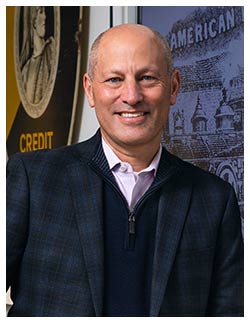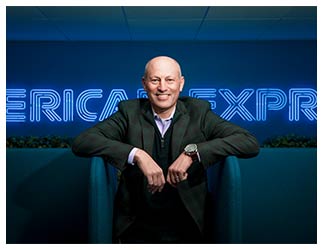Strength in Numbers
Senior vice president and deputy controller of American Express discusses his career
Story by Dr. Shirley Luna '85, '06 & '14

David Fabricant '93 is the type of guy who makes a plan and sticks to it.
As a freshman at Katy High School, Fabricant decided he would earn an accounting degree, thanks to a teacher who brought the subject to life for her students.
"She was passionate about it and convinced me I could be good at it," Fabricant recalled. "From that day forward, I never wavered on that decision."
Fabricant chose to attend SFA because he liked the idea of smaller class sizes that would allow him to interact with faculty members, and after graduation, he decided not to pursue the typical career route through a public accounting firm. Instead, he moved to Dallas and rejoined Club Corporation of America as a staff accountant, a company he had worked for as a student. After a few years, he joined Bristol Hotel and Resorts as a corporate accounting manager. Later, he was promoted to director of corporate accounting. Then, in 1999, he was hired by Citicards North America as controller and vice president for accounting operations.
The CPA's next career goal would take him to New York City.
"I was very driven and had a timeline in mind for how I wanted to progress to the next level," Fabricant said. "I wanted to continue to grow, and there are more opportunities in the headquarters of an organization than in a satellite office."
In 2006, Fabricant was hired by the American International Group, better known as AIG, as vice president and controller for the consumer finance division.
"AIG made a compelling offer that piqued my interest," he said. "At the time, they had a large and meaningful banking arm, and they were looking for senior-level controllers. It was a way to get to New York with a large company and a runway for growth."
From his office in New York, he was charged with overseeing the company's banking entities in a dozen countries, including China, India, the Philippines, Taiwan, Brazil and Russia.
"Two years later, the CEO said the Asia Pacific region of the division needed a new CFO and asked me to move to Hong Kong," Fabricant said. "I had traveled there many times to visit the team, but my wife had never been there, and we had three young kids at the time."
The Fabricant family made the move, and three months later, a wrench was thrown into Fabricant's carefully laid plans.
"AIG was considered by many to be a key player in the financial sector, both in the U.S. and internationally, whose importance to the stability of the banking industry made it 'too big to fail,'" said Dr. Mikhail Kouliavtsev, SFA chair of economics and finance.
However, the housing crisis and associated subprime loans caused AIG's credit rating to be lowered, and the company was forced to post collateral for its bondholders. As a result of this and other market conditions, the company lost $99.2 billion, and on Sept. 16, 2008, the Federal Reserve provided an $85 billion loan to keep the company intact. In return, AIG was required to sell all "noncore" assets, including the Asia unit where Fabricant was working.
"If the government hadn't stepped in, AIG would have gone bankrupt, possibly within one day," Fabricant said. "These were the most stressful days of my career, but I certainly learned about myself — about being a calming agent in the face of extreme crisis."
Fabricant concluded his work with AIG, and once again, his goal-setting nature came into play.
"I had always viewed American Express as a talent destination. The 'A' players want to be there," he explained. "But I really didn't know anyone with the company."
Fortunately, Fabricant was familiar with LinkedIn and knew how to use it.
"I did some research to find out how to make your profile discoverable — phraseology, keywords, how information should be structured," he said. "I did some work on my profile, and a recruiting firm working with American Express found me through LinkedIn."

In 2011 Fabricant began as a senior-level controller for American Express.
"As global consumer services controller, I made sure the business events were properly understood and translated into the appropriate accounting events," he explained. "There's a lot of judgment in accounting. Even though there are many black-and-white rules, you earn your salt in this profession through good judgment, interpreting and properly applying the rules to get the right business and economic outcomes within the confines of the standards."
After serving in several VP-level controller roles, Fabricant was promoted to his current position with American Express — senior vice president and deputy controller. In this position, he is head of the global record-to-report and leads a team of more than 800 colleagues responsible for global financial operations, reporting to regulatory agencies and the U.S. Securities and Exchange Commission.
Fabricant works to ensure that measures put in place to prevent financial upheavals similar to the one in 2008 are followed and reporting is accurate. The Dodd-Frank Wall Street Reform and Consumer Protection Act of 2010 reorganized the financial regulatory system and created the Consumer Financial Protection Bureau. The Federal Reserve has created a categorization for banks to tailor the regulations, with the largest banks referred to as GSIBs, or global systemically important banks, being held to the most rigid standards.
Fabricant is a member of Financial Executives International Committee on Corporate Reporting and serves on the Board of Directors of the New York chapter of Financial Executives International, a group that promotes programs to enhance the professional knowledge and qualifications of its members. He also is a member of Ernst & Young Corporate Controllers Leadership Network.
"SFA prepared me for an accounting career, and I started out working at some smaller companies where I had direct exposure to corporate controllers and CFOs who helped me tremendously," he stated. "I was fortunate to interact with some great leaders in each of the accounting roles I held, and those leaders made an investment in me, which goes back to the value of an organization that provides opportunities for interaction with leaders and mentors. This was critical to my success and to my ability to reach the goals I set."
 Axe ’Em, Jacks!
Axe ’Em, Jacks!
